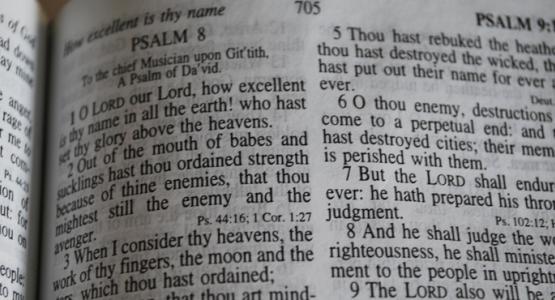
Psalm 8: The Greatness of God, Place of Man
Blog by Rob Vandeman
C. S. Lewis called Psalm 8 a “short, exquisite lyric.” Derek Kidner, in his excellent two-volume study of the Psalms, says, “This psalm is an unsurpassed example of what a hymn should be, celebrating as it does the glory and grace of God, rehearsing who He is and what He has done, and relating us and our world to Him, all with a masterly economy of words, and in a spirit of mingled joy and awe.” He adds rightly, “The range of thought takes us not only ‘above the heavens’ (v. 1) and back to the beginning (v. 3, 6-8) but, as the New Testament points out, on to the very end.” The psalm's theme is the greatness of God and the place of man (mankind) within God’s universe.
The hymn has four obvious parts:
- Celebration of the majesty of God (vs. 1-2);
- Confession of the insignificance of man (vs. 3-4);
- Astonishment at the significance of man (vs. 5-8); and a
- Concluding refrain that repeats the psalm’s first lines (v. 9).
The bulk of the psalm is about man, however. And the first thing that is asserted about man is his insignificance in the vast framework of creation. This grows out of the opening. For when the psalmist thinks of the glory of God exceeding the greatness of creation he is struck with how small man is by comparison.
I suppose this beautiful section of the psalm grew out of the psalmist’s experience of gazing at the night sky. If the author was David, he may have been remembering those nights as a youth on the hills surrounding Bethlehem tending his father’s sheep and studying the magnificence of the starry night while lying on his back. “What is man that you are mindful of him?” asked David when he recalled the stars’ vast array.
If this was David’s reaction, nearly 3,000 years ago, how much more should it be to those of us who live in the days of astrophysics, the Hubble telescope and space exploration? As we consider the orbiting planets of our solar system, so infinitesimally small in comparison with the countless galaxies millions of light years distant, it may seem to us, just as incredible and then some that the God of this vast universe should take note of us at all, let alone care for us.
Yet that is what God does. And not only that, but he has also given us a significance (Gen. 1:26f), a greatness and honor above everything else he has created. Our position of being only slightly inferior to the heavenly beings, or even to God Himself (as we are made in his image), is supremely seen in our “rule.” God has invested human beings with royal sovereignty, crowning us with glory and honor (v. 5) and delegating to us the control of His works. That is why Leupold in his Exposition on the Psalms gave title to this psalm as “God’s Glory Revealed in Man’s Dignity.”
Do an Internet search for pictures from the Hubble telescope. Get lost in wonder and awe at the pictures of the Milky Way, the Nebula of the constellation Orion, and the other far flung galaxies of our amazing universe. January is an especially good time for the viewing of Orion with the naked eye. What is your reaction to what you see? Does it bring forth the response of the psalmist…“What is man that you are mindful of him?” Then reread the creation account and think that the God of this immense universe made us in his image and made us caretakers of his creation. And ask yourself this question – “How are we doing with the ‘rule” of God’s creation?” Then read the New Testament’s use of this psalm and contemplate the reality that Christ fully reflected the dignity of humanity as created by God and that ultimately Christ will restore the dominion man lost at the Fall.
So when you read this psalm, what impression do you come away with, your insignificance in the universe or the dignity you possess bearing the image of the Creator? And think about how that reality should be reflected in your life.
Anybody else feel like singing "How Great Thou Art" right about now?
Blessings!

Add new comment